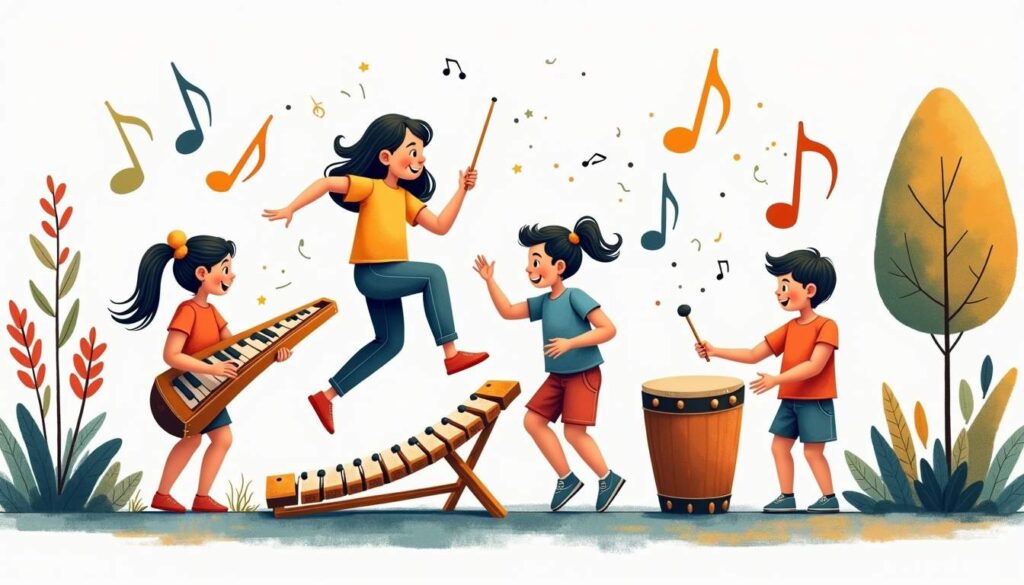In a world filled with various stimuli, music stands out as a universal language that transcends boundaries and connects people of all ages. For children, engaging with music can be particularly beneficial, fostering not just enjoyment but also critical developmental skills. This article explores how music time can significantly enhance a child’s cognitive, emotional, and social development.
The Cognitive Benefits of Music
Research has consistently shown that music can stimulate brain development in children. The cognitive benefits of music are profound, influencing areas such as memory, attention, and even language skills.
Enhancing Memory and Attention
Listening to and playing music requires concentration and memory recall, which can help children improve their overall cognitive abilities. For instance, learning to play an instrument involves memorizing notes and rhythms, which exercises the brain’s memory functions. This practice can translate into better retention of information in other areas, such as academics.
Moreover, music often requires children to pay attention to various elements simultaneously, such as pitch, tempo, and dynamics. This multitasking can enhance their ability to focus and concentrate, skills that are essential for success in school and beyond.
In addition to these benefits, engaging with music can also foster creativity and critical thinking. When children compose their own music or improvise during practice, they learn to think outside the box and explore various solutions to musical challenges. This creative process not only enriches their musical experience but also encourages them to approach problems in innovative ways in other subjects, such as math and science.
Language Development
Music is inherently linked to language. The rhythm and melody of songs can help children develop phonemic awareness, which is crucial for reading. Singing nursery rhymes and songs exposes children to new vocabulary and sentence structures, enriching their language skills.
Additionally, engaging with music can improve listening skills, as children learn to distinguish between different sounds and tones. This heightened auditory discrimination can facilitate better communication and comprehension, laying a solid foundation for literacy.
Furthermore, the social aspect of music-making can enhance language development as well. Participating in group music activities, such as choirs or bands, encourages children to interact with their peers, share ideas, and express themselves verbally. This collaborative environment not only boosts their confidence in using language but also helps them develop important social skills, such as teamwork and empathy, which are vital for effective communication in everyday life.
Would you like to check out one of the top-rated childcares in New Jersey? Schedule a tour with us!
Emotional and Social Growth Through Music
Music is not just about notes and rhythms; it also plays a vital role in emotional expression and social interaction. Engaging with music can help children navigate their feelings and build relationships with others.

Emotional Expression
Music provides a safe outlet for children to express their emotions. Whether they are feeling happy, sad, or frustrated, creating or listening to music can help them process these feelings. For instance, a child might write a song to express their joy or use music to soothe themselves during stressful times.
Furthermore, studies have shown that participating in musical activities can lead to increased self-esteem and confidence. When children learn to play an instrument or perform in front of an audience, they gain a sense of accomplishment that can positively impact their self-image. Additionally, music can serve as a powerful tool for emotional regulation; children often find that singing or playing their favorite songs can help them calm down or lift their spirits during challenging moments. This ability to use music as a coping mechanism can be invaluable as they navigate the ups and downs of growing up.
Social Skills Development
Participating in group music activities, such as choir or band, fosters teamwork and collaboration. Children learn to work together towards a common goal, which can enhance their social skills. They develop communication skills as they discuss music, share ideas, and provide feedback to one another.
Moreover, music can bridge cultural gaps, allowing children from diverse backgrounds to connect through a shared love of music. This exposure to different musical traditions can foster empathy and understanding, essential qualities in today’s global society. In a music ensemble, for example, children may encounter various genres and styles, from classical to hip-hop, which can inspire them to appreciate the richness of different cultures. Collaborative projects, such as composing a song together, not only strengthen friendships but also teach children the importance of listening and valuing each other’s contributions, laying the groundwork for effective communication and cooperation in all areas of life.
Physical Development Through Music
In addition to cognitive and emotional benefits, music can also contribute to physical development. Movement is often an integral part of musical activities, whether through dancing, playing instruments, or participating in rhythm games. The interplay between music and movement not only fosters creativity but also enhances physical capabilities, making it a vital component of holistic development in children.

Coordination and Motor Skills
Playing an instrument requires fine motor skills and hand-eye coordination. Children must learn to coordinate their fingers, hands, and sometimes even their feet to produce music. This practice can enhance their overall motor skills, which are crucial for various daily activities. For instance, learning to play the piano involves pressing keys with precision, which can translate into improved dexterity in tasks such as writing or using tools.
Furthermore, rhythmic activities, such as clapping or dancing, can improve gross motor skills. Engaging in music and movement helps children develop balance, agility, and spatial awareness, all of which are essential for physical development. Activities like drumming not only require coordination but also encourage children to keep time, promoting a sense of rhythm that can be beneficial in various sports and physical activities.
Promoting Healthy Habits
Incorporating music into physical activities can also promote a more active lifestyle. Dance, for example, is a fun way for children to exercise while enjoying music. This combination can instill a love for movement and physical activity, contributing to better health outcomes as they grow. Dance styles such as ballet, hip-hop, or folk dancing not only provide a workout but also introduce children to cultural expressions, enriching their understanding of the world.
Moreover, music can serve as a motivational tool, encouraging children to participate in sports or other physical activities. The right soundtrack can make exercise feel more enjoyable, leading to a lifelong appreciation for fitness. For example, upbeat music can elevate mood and energy levels, making activities like running or cycling feel less daunting. Additionally, group music-making experiences, such as marching bands or community dance classes, foster social connections, which can further encourage children to remain active and engaged in their communities.
Creating a Musical Environment at Home
To harness the developmental benefits of music, it is essential to create a musical environment at home. This can be achieved through various strategies that encourage children to engage with music regularly.
Incorporating Music into Daily Routines
Integrating music into everyday activities can make it a natural part of a child’s life. For instance, playing music during meals, bath time, or while doing chores can create a joyful atmosphere. Singing songs together can also make these routines more enjoyable and memorable.
Additionally, parents can encourage their children to explore different genres of music. Introducing them to classical, jazz, folk, and contemporary music can broaden their musical horizons and spark an interest in various styles.
Would you like to check out one of the top-rated childcares in New Jersey? Schedule a tour with us!
Encouraging Instrumental Learning
Providing children with the opportunity to learn an instrument can be one of the most impactful ways to foster their musical development. Whether it’s piano, guitar, or drums, learning to play an instrument can enhance their cognitive and emotional skills.
Parents can start by offering lessons or enrolling their children in music classes. Even simple instruments, such as ukuleles or keyboards, can be accessible and fun for children to learn. The key is to make the experience enjoyable and pressure-free, allowing children to explore their musical interests at their own pace.
Music and Cultural Awareness
Music is a powerful tool for fostering cultural awareness and appreciation. By exposing children to diverse musical traditions, they can develop a broader understanding of the world around them.

Exploring World Music
Introducing children to music from different cultures can spark curiosity and interest in global diversity. Parents can create playlists featuring music from various countries and encourage discussions about the cultural significance of different musical styles.
Attending local cultural festivals or concerts can also provide opportunities for children to experience live music from around the world. These experiences can deepen their appreciation for different cultures and promote inclusivity.
Creating Family Traditions
Establishing family music traditions can be a wonderful way to bond and create lasting memories. Whether it’s a weekly family jam session, karaoke night, or simply sharing favorite songs, these traditions can strengthen family ties and create a shared love for music.
Moreover, involving children in the selection of music for family events can give them a sense of ownership and pride, further enhancing their connection to music.
Conclusion: The Lasting Impact of Music on Child Development
In conclusion, music time offers a multitude of benefits that can accelerate a child’s development across various domains. From cognitive and emotional growth to physical development and cultural awareness, engaging with music can enrich a child’s life in countless ways.
By creating a musical environment at home and encouraging participation in musical activities, parents can help nurture their child’s innate musical abilities and foster a lifelong love for music. The journey of musical exploration can lead to enhanced skills, deeper connections, and a greater understanding of the world, making it an invaluable aspect of childhood development.
Ultimately, the impact of music extends far beyond mere entertainment; it shapes the very fabric of a child’s development, paving the way for a brighter future filled with creativity, empathy, and joy.
Would you like to check out one of the top-rated childcares in New Jersey? Schedule a tour with us!










